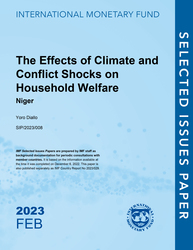
The Effects of Climate and Conflict Shocks on Household Welfare: Niger
As livelihoods in Niger still depend to a large extent on agricultural production, shocks related to climate change and insecurity present a threat for the country’s development path and are the main sources of vulnerability for the population in rural areas.
READ MORE...
Volume/Issue:
Volume 2023
Issue 008
Publication date: February 2023
ISBN: 9798400236068
$15.00
Add to Cart by clicking price of the language and format you'd like to purchase
Available Languages and Formats
| English |
Prices in red indicate formats that are not yet available but are forthcoming.
Topics covered in this book
This title contains information about the following subjects.
Click on a subject if you would like to see other titles with the same subjects.
Economics- Macroeconomics , Money and Monetary Policy , International - Economics , Environmental Economics , Demography , Climate Shocks , Conflicts , Welfare , Microeconometrics , Niger , conflict shock , household welfare , vulnerability to climate change , impact of shock , income elasticity , Climate change , Income , Consumption
Summary
As livelihoods in Niger still depend to a large extent on agricultural production, shocks related to climate change and insecurity present a threat for the country’s development path and are the main sources of vulnerability for the population in rural areas. This paper uses data from the latest household living standard survey to quantify the effects and interactions of these shocks on household welfare before proposing policy recommendations to enhance the resilience of households and the economy more generally. Our results show that when rainfall decreases by one standard deviation, per capita income falls by 11 percent. Furthermore, the impact of shocks on households depends on their adaptive capacity, which includes sufficient agricultural capital and income diversification. Without concrete adaptation measures, vulnerability to climate change is expected to increase in Niger, and human capital accumulation in poor household is also expected to deteriorate and could lead to a poverty trap.
Copyright © 2010 - 2026
Powered by:
AIDC



